高英二第四课
Waiting for a Taxi复旦高级英语第二册第四课

The development of globalization not only changes the traditional production system in China, but also creates a new production body--the immigrant workers.
Show me a minimum wage or part time worker, who can afford to buy a home and / or raise a family on his / her inadequate income. Show me how such workers are supposed to keep themselves and their children housed, fed and healthy. Should not human equality, abundance and peace be the right of every human being? ….
The AFL-CIO report, Immigrant Workers at Risk: The Urgent Need for
Improved Workplace Safety and Health Policies and Programs
Slavery The Beginning of Slavery The first Africans in America arrived as Indentured Servants via Jamestown, Virginia in 1619. From 1619 to about 1640, Africans could earn their freedom working as laborers and artisans for the European settlers. Africans could become free people and enjoy some of the liberties like other new settlers. Slave Trade The peoples inhabiting those African nations were known for their skills in agriculture, farming, and mining. The rising demand for sugar, coffee, cotton, and tobacco created a greater demand for slaves by other slave trading countries.
高级英语第二册第四课Vocabulary 4

• inaugural (adj.): of an inauguration就 职(典礼)的
• signify (v.): be a sign or indication of; mean表明;意味
• almighty (adj.): having unlimited power;all-powerful; omnipotent 有无 限权力的;全能的
• belabor (v.): talk about at unnecessary length唠唠叨叨地反复讲
• formulate (v.): put together and express (a theory . plan ,etc.)a systematic way系统地阐述(或提出)(理 论、计划等)
• invective (n.): a violent verbal attack . strong criticism , insults, curses, etc.; vituperation 抨击;辱骂, 谩骂
• shield (n.): any person or thing that guards , protects , or defends; protection保护人;防护物;保护
• tap (v.): draw upon;make use of开发、 发掘
• heed (v.): pay close attention to; take careful notice of注意, 留神,留 心
• beachhead (n.): a position established by invading troops on an enemy shore;atarting point for any action; foothold滩头堡,登陆场;立足点
高级英语第二册第四课相关逻辑知识

了解基本逻辑,避免常见错误要了解基本逻辑错误一定不能错过一篇英文小品文Love Is A Fallacy (作者Max Shulman),这里仅列举出十种最常见的逻辑错误。
1.草率前提(Dicto Simpliciter)例如:Women are on average not as strong as men and less able to perform well politically. Therefore, women can't pull their weight in government work.点评:虽然女性确实在政界担任较少工作,但这不意味着女性群体中所有的人都是这样。
2.过度概化(Hasty Generalization)例如:McDonald's and KFC offer foods with little nutrition, and thus we cannot expect any fast food restaurant to provide us with nutritious foods.点评:两个个例不足以推出一个真理。
3.因果颠倒(Post Hoc)例如:Most young criminals watch violent movies before they commit their crimes; obviously, violent movies lead to juvenile delinquency.点评:甲事情发生在乙事情之前,这并不代表着先发生的甲事情就是后发生的乙事情的原因。
4.矛盾前提(Contradictory Premises)例如:If God can do everything, can he make a stone so heavy that he can't carry?点评:前提条件中就有相互矛盾的地方,结论当然是错误的。
高级英语课程教案第二册第四课

Reference Books 1.The New Book of Knowledge2.Encyclopedia Britannica3.Encyclopedia Americana4.Any History of the U.S covering the 1960’s5.Any biographical sketch of John F. Kennedy附页附页Question 3A piece of News 附页附页1. John F. Kennedy (1917--1963), 35th President of the United StatesA. His family backgroundJohn Kennedy, whose ancestors came from Ireland, was the first Roman Catholic to become president of the United States. At 43 he was also the youngest man ever elected to the highest office of his country, although he was not the youngest to serve in it. Theodore Roosevelt was not quite 43 when the assassination of President McKinley elevated him to the Presidency.John Fitzgerald Francis Kennedy was born on May 29, 1917 in Brookline, Massachusetts. Brookline was the suburb of Boston where his grandfather had been elected to many public offices. Joseph P. Kennedy, father of the future president, was at 25 the youngest bank president in the country. He was to build one of the great private fortunes of his time. He and Rose Fitzgerald Kennedy raised a family of nine children. John was the second born.When the first Kennedy child, Joseph, Jr., was born, father Joe was reported to have said, “He’ll be the first Kennedy to become president of the United States.” But he was killed while piloting a bomber in World War II, and the leadership of the rising Kennedy generation passed to John.Thus young John Kennedy, often called Jack, inherited a background of politics, wealth and determination. The family circle was close and warm. The boys learned competition first in sports. They, played hard to win, a family trait in sports and politics all their lives. Young Kennedy attended private schools in Brookline and New York City; and then in 1931, he entered Choate School, in Wallingford, Connecticut to prepare for college, Young Kennedy, after a short spell at the London School of Economics and Princeton, entered Harvard. In 1940 he graduated from Harvard cum lauds.B. His political career and election as presidentIn 1945 the Hearst newspapers hired Kennedy to cover the United Nations preliminary conference in San Francisco. He covered the British elections that year, then decided he had had enough of journalism. He did not know whether he would like politics, but decided to try it. In 1946 he ran for Congress as a Democrat, in a Boston district. Though he did not live there, Kennedy, by hard campaigning, defeated a large field of rivals. He was re-elected twice. Then he tried for election to the United States Senate against Republican Henry Cabot Lodge, who was supposed to be unbeatable in Massachusetts. It was a big Republican year in 1952, in Massachusetts and elsewhere, but Jack Kennedy beat Lodge by 70,000 votes.On September 12, 1953, Kennedy and Jacqueline Bouvier were married at Newport, Rhode Island. They had three children-Caroline; John, Jr., whom his father called John-John; and Patrick Bouvier, who lived but a few days.Kennedy missed being nominated for vice-president by a few votes in 1956. But he gained an introduction to millions of Americans who watched the Chicago Democratic Convention on television. When he decided to run for president in 1960, his name was widely known. Many thought that his religion and his youthful appearance would handicap him. Kennedy faced the religion issue frankly. He declared his firm belief in the separation of church and state. His wealth enabled him to assemble a staff and to get around the country in a private plane.Kennedy’s four television debates with Republican candidate, Richard M. Nixon, were a highlight of the 1960 campaign. The debates probably were important in Kennedy’ s close victory--303electoral votes to 219 for Nixon. The popular vote was breathtakingly close; Kennedy received only 18,574 more votes than Nixon--a fraction of 1 percent of the total vote.(excerpts from the New Book of Knowledge)C. AssassinationIn November 1963, President Kennedy journeyed to Texas for a speech-making tour. In Dallas on November 22, he and his wife were cheered enthusiastically as their open car passed through the streets. Suddenly, at 12:30 in the afternoon, an assassin fired several shots, striking the president twice, in the base of the neck and the head, and seriously wounding John Connally the governor of Texas, who was riding with the Kennedys. The president was rushed to Parkland Memorial Hospital, where he was pronounced dead about a half hour later. Within two hours, Vice president Johnson took the oath as president.On November 24, amid national and worldwide mourning, the President’s body lay in state on the rotunda of the U. S. Capitol. The next day, leaders of 92 nations attended the state funeral, and a million persons lined the route as a horsedrawn caisson bore the body to St. Matthew’s Cathedral for a requiem mass. While millions of Americans watched the ceremonies on television, the president was buried on an open slope in Arlington National Cemetery. There an eternal flame(常明火), lighted by his wife marks the grave.On the day of the assassination, the police arrested Lee Harvey Oswald, a 24-year-old ex-marine, for the president’s murder. Oswald, who had lived for a time in the Soviet Union, killed Dallas policeman J.D. Tippit while resisting arrest. Two days later, in the basement of the Dallas police station, Oswald himself was fatally shot by Jack Ruby, a nightclub owner.On November 29, President Johnson appointed a seven-member commission, headed by Chief Justice Earl Warren, to conduct a thorough investigation of the assassination and report to the nation. The commission’s report made public on Sept. 27, 1964, herd that Oswald fired the shots that killed the president. Further, to allay suspicions that the murder was a conspiratorial plot, it stated that the committee “found no evidence” that either Oswald or Ruby “was part of any conspiracy, domestic or foreign, to assassinate President Kennedy.”(from Encyclopedia Americana )2. InaugurationA. Inauguration Day:On April 30, 1789, George Washington stepped onto a balcony of Federal Hail in New York City, placed his hand on a Bible and swore to “preserve, protect and defend the Constitution of the United States. He then read an earnest speech, calling for “united and effective government”. Thus began a unique American institution--Inauguration Day--those dramatic hours when a new president faces the people for the first time.From 1793 until 1933 the induction of the new president was scheduled for noon on March 4, every fourth year. Under the 20th Amendment to the U. S Constitution it has taken place on January 20 since 1937. (Zachary Taylor was sworn in on March 5, 1849, to avoid taking the oath on Sunday.)The presidential oath, traditionally administered by the chief justice, is prescribed in Article II, section 1, of the Constitution. The incoming vice-president takes a similar oath. The ceremonies attending the swearing-in are extra-constitutional. Presidents who succeeded to the office on the death of the incumbent have been sworn in speedily and without ceremony.B. Inaugural Addresses: Memorable words have been uttered in inaugural addresses. In 1801, Thomas Jefferson called on a divided nation to uphold the basic principle of democracy, “absolute acquiescence in the will of the majority.” Abraham Lincoln, in 1861, warned the Southern states not to secede, appealing to “the mystic cords of memory, stretching forth from every battlefield and patriot grave.” In 1933 Franklin D. Roosevelt told Depression-racked Americans that” the only thing we have to fear is fear itself.” in 1961, John F. Kennedy said, “My fellow Americans: ask not what your country can do for you--ask what you can do for your country.”James Monroe, speaking from the steps of the Capitol, delivered the first outdoor inaugural address in 1871. Since then only the inauguration of William Howard Taft during a blizzard in 1909 has been held indoors.Not all inaugural speeches have been a success. Martin Van Buren was overshadowed by the outgoing president Andrew Jackson, and the crowd barely listened to him. Franklin Pierce, in 1853, tried in vain to make himself heard above a howling snow-storm. Rutherford B. Hayes, winner of the disputed election of 1876, had to endure boos, catcalls, and assassination threats.Some presidents contributed personal touches to the ceremony. Washington added to his oath “so help me God,” and kissed the Bible. In 1905, Theodore Roosevelt wore a ring containing a lock of hair cut form Lincoln’s head after he was shot. In 1937, Franklin D. Roosevelt rode bareheaded down Pennsylvania Avenue in an open car, sharing the driving rain with the spectators.C. The Inaugural Parade and Ball: The inaugural parade had grown from several hundred marchers to the record 40, 000 persons who walked past Woodrow Wilson in 1931. In 1965, Lyndon B.Johnson limited marchers to 15,000. Mrs. James Madison began thetradition of an inaugural ball in 1809. In 1809 some 6,000 peoplebought tickets to Ulysses S. Grant’s inaugural ball, and a near riotensued when the ball could not accommodate them. The ball hasgrown to such proportions that it is divided among four o fiveballrooms in Washington.(from Encyclopedia Americana)附页附页3Text Analysis (Brief))Introduction tothe Passage1.Type of literature: political speech2.Object of a political speech:--to explain--to convince--to persuade3.Well organized and highly rhetorical4.Biblical style/language5.Often-quoted passagesEffective Writing Skills 1.Employing suitable rhetorical devices and words to create thedesired emotional impact2.clear order and appropriate tone to the different groups heis addressing3.Employing Biblical style deliberatelyRhetorical Devices 1.metaphor2.antithesis1.parallelism2.repetitionSpecial Difficulties 1. Biblical language/quotations/styleing the following methods for force, vividness and emotionalappeal:--Parallel and balanced structure--Repetition of important words--Antithesis3.Paraphrasing some sentences4.Identifying figures of speech 附页3The object of a political speech is to explain, convince and persuade the people that what he is saying and planning to do best represents their interests so they should support him. As president of the United States, Kennedy has to address a world- wide audience. He has to appeal not only to the American people but also to the different groups of nations in the international community.In order to understand and evaluate his speech better, we should also bear in mind that he became president during the cold war period when the world was divided into two hostile camps. The message of the address is clear. The United States, the self-appointed leader of the “free democracies”, is prepared to pay any price to defend human rights and the liberty and independence of free nations, so these nations should support and accept the leadership of the United States. There is veiled threat, warning and advice to the enemy camp. She is prepared to “oppose any foe” and “dare not tempt them with weakness”, so they should negotiate and cooperate.This speech is well organized and highly rhetorical. It is mostly persuasionwith very little explanation. As the address is generally short it has to rely chiefly on a successful appeal to emotions for it does not have time enough to cite facts and reasons which could convince. To do this successfully, the speaker must first understand the psychology of the audience to whom he is directing his words and then employ suitable rhetorical devices and words to create the desired emotional impact. The first five paragraphs of this speech is a general statement of basic policy goals. In paragraphs 6 to 9 he addresses different groups of allied nations or would-be allies. In 11--19 he speaks to his enemy. Finally he appeals to his countrymen for support and sacrifice. The order is clear and the tone appropriate to the different groups he is addressing.Besides figures of speech and the appropriate use of words, parallel and balanced structures, repetition of important words and phrases, and antithesis are employed for force, vividness and emotional appeal. Paras 6, 7, 8, 10, and 11 begin with the same type of phrases: “To those old allies...”, “To those new States...”, “To those peoples”, “To our sister republics...”, “To that world assembly...”and “to those nations... “. Paras15, 16, 17, 18 begin with the same type of phrases: “Let both sides...”. Besides these, there are many other examples of parallel structures. As for repetition of important words we have: all forces” and “belief” (para. 2); “committed” (para. 3);”good” and “free” (para. 9), etc. Finally antithesis is also often used for force and vividness, e.g. “United, there is little ...Divided, there is little...(para.. 6);” If a free society cannot who are rich.” (para.. 8); and “Let both sides explore... divide us.” (para.. 15).Another point that one notices is Kennedy’s deliberate use of a pseudo-Roman style or Biblical language in some places. Perhaps, he thinks this kind of language adds solemnity to some of his weightier sayings. Here are some examples that illustrate this point:1) And yet the same revolutionary belief for which our forbears fought is still at issue around the globe, the belief that the rights of man come not from the generosity of the state but from the hand of God. (para. 2)2) Let the word go forth from this time and place... (para. 3)3) to strengthen its shield of the new, and to enlarge the area in which its writ may run. (para. 10)4) And so, my fellow Americans ask not what... your country. (para. 25)Persuasion based on emotional appeal can be successful only on special occasions for it does not put forward sufficient facts and reasons to convince. It can be successful when the audience is excited and does not have much time to think or when the audience is already susceptible to the message of the speaker. Political demagogy, however, relies on emotional appeal for its success.。
高级英语第二册第四课课文翻译

第四课就职演说(1961年1月20日)我们今天举行的不是一个政党的祝捷大会,而是一次自由的庆典。
这是一个承先启后、继往开来的大事件。
因为刚才我已依照我们的先辈在将近一又四分之三个世纪以前拟好的誓言在诸位和全能的上帝面前庄严宣誓。
当今的世界已与往昔大不相同了。
人类手中已掌握的力量,既足以消除一切形式的人类贫困,也足以结束一切形式的人类生活。
然而,我们的先辈曾为之奋斗的革命信念至今仍未能为举世所公认。
这信念就是认定人权出自上帝所赐而非得自政府的恩典。
我们今天仍未敢忘记我们是第一次革命战争的接班人。
此时此地我谨向我们的朋友,同时也向我们的敌人宣告:火炬已传到我们新一代美国人手中。
这一代人在本世纪成长起来,经受过战火的锻炼,经历过冷峻的和平的考验,以珍视古老的传统而自豪,又决不愿坐视或容许人权逐渐遭到践踏。
美国对这些人权一向负有责任,今天我们也正在本国及全世界范围内为之奋斗。
必须让每一个友邦和敌国都知道:为维护自由,使其长存不灭,我们将会不惜付出任何代价,肩负任何重担,迎战一切困难,援助一切朋友,反击一切敌人。
以上这些是我们保证要做到的——但我们保证要做到的还不止这些。
对于那些与我们有着共同的文化和精神渊源的传统盟邦,我们保证将报之以真诚不渝的友谊。
只要我们团结起来,我们在许多合作性事业中就会无往而不胜;而一旦彼此分裂,我们就会无所作为。
因为我们之间若起争端,彼此离异,便难以与我们面临的强大对手抗衡。
对于那些我们欢迎其加入自由国家行列的各新兴国家,浅们发誓,一种形式的殖民统治的结束绝不应仅是为了被另一种远为残酷的暴政所取代。
我们并不期望这些国家总是支持我们的观点,但我们希望他们始终能够坚决地卫护自己的自由,并时刻牢记,过去那些企图骑上虎背为自己壮声势的愚人结果都没能逃脱葬身虎腹的命运。
对于那些居住在遍布半个地球的茅舍荒村中,正奋力冲破集体贫困的桎梏的各民族,我们保证将尽最大努力帮助他们脱贫自救,不管这样做需要多长时间。
高级英语2第三版lesson4爱情就是谬误课文翻译
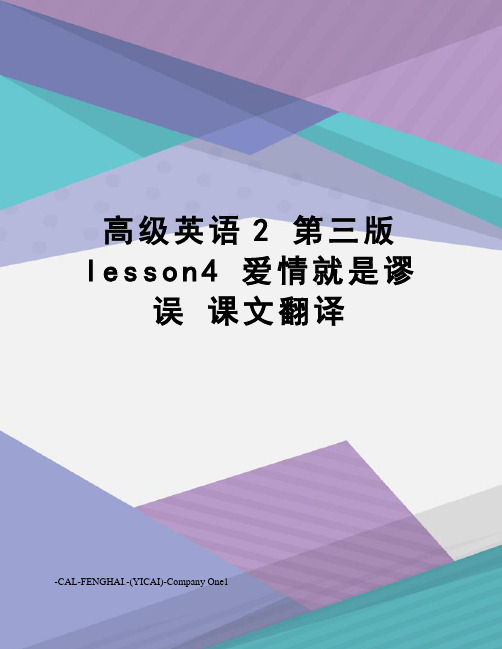
高级英语2第三版l e s s o n4爱情就是谬误课文翻译-CAL-FENGHAI.-(YICAI)-Company One1爱情就是谬误马克斯·舒尔曼查尔斯·兰姆是一个百年难遇的性情欢快且富有进取心的人。
他那令人难忘的作品《古瓷器》和《梦中的孩子》打破了随笔的羁绊。
下面这篇文章甚至比兰姆的作品更加随意。
实际上,用“随意”这个字眼来形容这篇文章或许并不十分恰当;用“柔软的”、“松软的”或“富有弹性”或许更为恰当。
尽管这篇文章所属的类别是模糊的,但可以肯定它是一篇散文。
它提出了论点,列举了例子,并得出了结论。
卡菜尔能写出比这更好的作品吗拉斯金呢那么,就读一读下面的文章吧。
这篇文章意在论证逻辑学远非一门枯燥乏味而又迂腐的学科,而是一种活泼、清新的事物,充满了美感、激情和创伤。
——作者注1. 本人头脑冷静、逻辑性强。
敏锐、精明、机智、灵敏、狡黠------这些品质我都具备。
我的大脑像发电机一样有力,像化学家的天平一样精确,像手术刀一样锋利。
难以想象吧!我才十八岁。
2. 如此年轻而又才智卓越的人并不常有。
就拿我在明尼苏达州大学的室友皮蒂·伯奇来说吧。
他跟我年龄相同,背景相似,却蠢笨如牛。
要知道,他是个英俊年轻的小伙子,可脑袋却空空如也。
他容易激动,情绪反复无常,易受影响。
最糟糕的是,他是一个爱赶时髦的人。
我认为,赶时髦是最缺乏理智的表现。
追随每一次新出现的时尚,身不由己地做着种种蠢事,仅仅因为别人都在这么做------在我看来,这愚蠢至极。
然而皮蒂却不这么认为。
3. 一天下午,我发现皮蒂躺在床上,脸上流露出一种痛苦不堪的表情,我立刻断定他得了阑尾炎。
“别动,”我说,“别吃泻药,我去请医生。
”4.“浣熊,”他咕哝道。
5.“浣熊”我停下飞快的脚步问道。
6.“我想要一件浣熊皮大衣,”他哭着嚷道。
7.我意识到他的问题不是身体上的,而是精神上的。
“你为什么想要一件浣熊皮大衣呢”8.“我早就该知道,”他哭叫着,捶打着自己的太阳穴,“我早就该知道查尔斯顿舞再度流行时,浣熊皮大衣也会再次时兴起来。
高级英语第二册Lesson 4课后练习
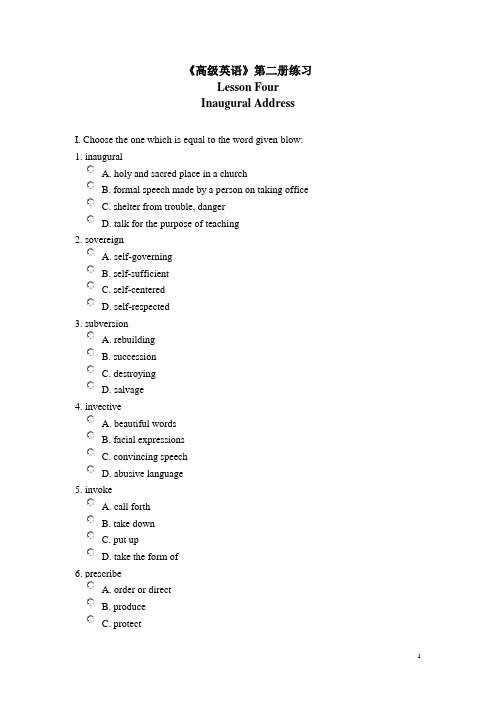
《高级英语》第二册练习Lesson FourInaugural AddressI. Choose the one which is equal to the word given blow:1. inauguralA. holy and sacred place in a churchB. formal speech made by a person on taking officeC. shelter from trouble, dangerD. talk for the purpose of teaching2. sovereignA. self-governingB. self-sufficientC. self-centeredD. self-respected3. subversionA. rebuildingB. successionC. destroyingD. salvage4. invectiveA. beautiful wordsB. facial expressionsC. convincing speechD. abusive language5. invokeA. call forthB. take downC. put upD. take the form of6. prescribeA. order or directB. produceC. protectD. agree7. tribulationA. contributionB. deliveryC. distributionD. great difficulty or trouble8. adversaryA. a person who gives adviceB. a friendC. an enemyD. a listener9. civilityA. rough mannersB. polite behaviourC. polite citizenD. rude person10. engulfA. swallow upB. consider aboutC. clean upD. imprint on11. heedA. rise on feetB. strike on the headC. give new life and strengthD. pay attention to12. shieldA. person or thing that protectsB. a court order prohibiting or ordering a given actionC. a person or animal inhabiting a specified placeD. an apparatus used in inhaling medicinal vapors13. asunderA. from belowB. apart in direction or positionC. in or to a low placeD. from an upright position14. belabourA. ask sb. to work hardB. set upon with too much talkC. furnish with powerD. force upon others15. eradicateA. cut into many small partsB. go round in circleC. draw together into a small spaceD. put an end to; destroy16. observeA. celebrateB. preserveC. orateD. help17. almightyA. intensiveB. all-powerfulC. instructiveD. all-round18. symbolizeA. make signB. show pityC. representD. present19. undoingA. showingB. lazinessC. coverD. destruction20. permitA. fill inB. consentC. get intoD. explain21. commitA. pledgeB. omitC. refrainD. repeat22. hostA. a fewB. multitudeC. houseD. exclusion23. allianceA. dominationB. transactionC. disintegrationD. association24. castA. insertB. fallC. throwD. leap25. preyA. victimB. requireC. addressD. beg26. aggressionA. defenceB. invasionC. injuryD. disclosure27. outpaceA. fall behindB. step outC. walk outsideD. surpass28. anewA. once moreB. strangeC. famousD. weary29. testimonyA. evidenceB. witnessC. liberationD. trial30. inspectionA. predictionB. warm speechC. expectationD. examination6. to take an oath s10. to do away with completely athe horizon. h12. a group of persons gathered together for a common reason, as for a legislative,religious, educational, or social purpose. awithout proof s16. to call together s18. be delighted r20. ardent, often selfless affection and dedication dboon b24. to give warning to a26. to have meaning or importance sor a sacred object as witness o30. an adversary; an opponent fIV. Reading Comprehension:1. The real thesis of this piece of exposition is _______A. Pub talk and the King’s EnglishB. Conversation is the most sociable of all human activitiesC. Bar conversation has a charm of its ownD. The King’s English2. This piece of exposition is _____ in style.A. formalB. informalC. sarcasticD. serious3. One of the reasons for him to like bar conversation is that ______.A. He was a sociable person and enjoyed talking with others.B. e was brought up in the English pubs.C. He was deeply involved in bar-goers’ lives.D. He was a frequenter of the English pubs4. “The King’s English ” came into being in ______.A. 16th centuryB. 17th centuryC. 15th centuryD. 18th century5. The worst conversationalist is the person who ______.A. is not making a pointB. is prepared to looseC. is trying to talk senseD. slips and slides in conversationVII. Translation:1. 他们的友谊是在困难时期由于同甘苦共患难而结成的。
高级英语2 Unit 4

I: Biblical language & Biblical allusions In terms of paragraphs & forms: Shorter paragraphs; more italics; words “Lord, God” In terms of grammar: Simple sentence structures Old form of pronouns & verbs In terms of vocabulary: Archaic words e.g subtil Specifically-employed words Most words are short The “do + V” and “did + V”
The Death of John F. Kennedy
“The inauguration of John F. Kennedy provided the prospect of a new beginning for the nation. His vision and message and the vigor with which he undertook his responsibilities created high expectations.” --------Richard Bissell
Paraphrase
Student’s book (page 59)
Back
Translation
Group I: We observe today not a victory…… nearly a
century and three-quarters ago. (1)
Group II: Let the word go forth……around the world. (2) Group III: para 4 Group IV: para 14 Group V: parae devotion……can
高级英语第二册1----4课课后答案

高级英语第二册1----4课课后答案-CAL-FENGHAI.-(YICAI)-Company One1第一课位于高尔夫港以西的帕斯克里斯琴镇几乎被夷为平地。
住在该镇那座豪华的黎赛留公寓度假的几位旅客组织了一次聚会,从他们所居的有利地位观赏飓风的壮观景象,结果像是有一个其大无比的拳头把公寓打得粉碎,26人因此丧生。
柯夏克家的屋顶一被掀走,约翰就高喊道:“快上楼一一到卧室里去!数数孩子。
”在倾盆大雨中,大人们围成一圈,让孩子们紧紧地挤在中间。
柯夏克老奶奶哀声切切地说道:“孩子们,咱们大家来唱支歌吧!”孩子们都吓呆了,根本没一点反应。
老奶奶独个儿唱了几句,然后她的声音就完全消失了。
客厅的壁炉和烟囱崩塌了下来。
弄得瓦砾横飞。
眼看他们栖身的那间卧室电有两面墙壁行将崩塌,约翰立即命令大伙:“进电视室去!”这是离开风头最远的一个房间。
约翰用手将妻子搂了一下。
詹妮丝心里明白了他的意思。
由于风雨和恐惧,她不住地发抖。
她一面拉过两个孩子紧贴在自己身边,一面默祷着:亲爱的上帝啊,赐给我力量,让我经受住必须经受的一切吧。
她心里怨恨这场飓风。
我们一定不会让它得胜。
柯夏克老爹心中窝着一团火,深为自己在飓风面前无能为力而感到懊丧。
也说不清为什么,他跑到一问卧室里去将一只杉木箱和一个双人床垫拖进了电视室。
就在这里,一面墙壁被风刮倒了,提灯也被吹灭。
另外又有一面墙壁在移动,在摇晃。
查理.希尔试图以身子撑住它,但结果墙还是朝他这边塌了下来,把他的背部也给砸伤了。
房子在颤动摇晃,已从地基上挪开了25英尺。
整个世界似乎都要分崩离析了。
“我们来把床垫竖起来!”约翰对父亲大声叫道。
“把它斜靠着挡挡风。
让孩子们躲到垫子下面去,我们可以用头和肩膀把垫子大一点的孩子趴在地板上,小一点的一层层地压在大的身上,大人们都弯下身子罩住他们。
地板倾斜了。
装着那一窝四只小猫的盒子从架上滑下来,一下子就在风中消失了。
斯普琪被从一个嵌板书柜顶上刮走而不见踪影了。
高级英语2 第三版 lesson4 爱情就是谬误 课文翻译

爱情就是谬误马克斯·舒尔曼查尔斯·兰姆是一个百年难遇的性情欢快且富有进取心的人。
他那令人难忘的作品《古瓷器》和《梦中的孩子》打破了随笔的羁绊。
下面这篇文章甚至比兰姆的作品更加随意。
实际上,用“随意”这个字眼来形容这篇文章或许并不十分恰当;用“柔软的”、“松软的”或“富有弹性”或许更为恰当。
尽管这篇文章所属的类别是模糊的,但可以肯定它是一篇散文。
它提出了论点,列举了例子,并得出了结论。
卡菜尔能写出比这更好的作品吗?拉斯金呢?那么,就读一读下面的文章吧。
这篇文章意在论证逻辑学远非一门枯燥乏味而又迂腐的学科,而是一种活泼、清新的事物,充满了美感、激情和创伤。
——作者注1. 本人头脑冷静、逻辑性强。
敏锐、精明、机智、灵敏、狡黠------这些品质我都具备。
我的大脑像发电机一样有力,像化学家的天平一样精确,像手术刀一样锋利。
难以想象吧!我才十八岁。
2. 如此年轻而又才智卓越的人并不常有。
就拿我在明尼苏达州大学的室友皮蒂·伯奇来说吧。
他跟我年龄相同,背景相似,却蠢笨如牛。
要知道,他是个英俊年轻的小伙子,可脑袋却空空如也。
他容易激动,情绪反复无常,易受影响。
最糟糕的是,他是一个爱赶时髦的人。
我认为,赶时髦是最缺乏理智的表现。
追随每一次新出现的时尚,身不由己地做着种种蠢事,仅仅因为别人都在这么做------在我看来,这愚蠢至极。
然而皮蒂却不这么认为。
3. 一天下午,我发现皮蒂躺在床上,脸上流露出一种痛苦不堪的表情,我立刻断定他得了阑尾炎。
“别动,”我说,“别吃泻药,我去请医生。
”4.“浣熊,”他咕哝道。
5.“浣熊?”我停下飞快的脚步问道。
6.“我想要一件浣熊皮大衣,”他哭着嚷道。
7.我意识到他的问题不是身体上的,而是精神上的。
“你为什么想要一件浣熊皮大衣呢?”8.“我早就该知道,”他哭叫着,捶打着自己的太阳穴,“我早就该知道查尔斯顿舞再度流行时,浣熊皮大衣也会再次时兴起来。
我真傻,所有的钱都买了课本,而现在却没钱买浣熊皮大衣了。
高级英语第二册1----4课课后答案
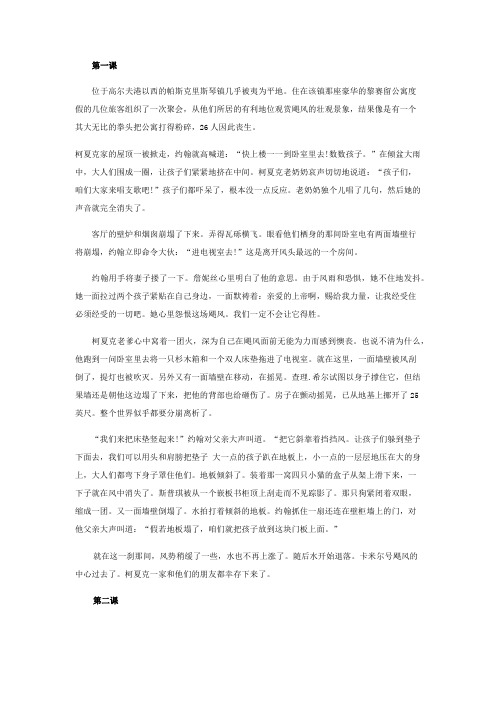
第一课位于高尔夫港以西的帕斯克里斯琴镇几乎被夷为平地。
住在该镇那座豪华的黎赛留公寓度假的几位旅客组织了一次聚会,从他们所居的有利地位观赏飓风的壮观景象,结果像是有一个其大无比的拳头把公寓打得粉碎,26人因此丧生。
柯夏克家的屋顶一被掀走,约翰就高喊道:“快上楼一一到卧室里去!数数孩子。
”在倾盆大雨中,大人们围成一圈,让孩子们紧紧地挤在中间。
柯夏克老奶奶哀声切切地说道:“孩子们,咱们大家来唱支歌吧!”孩子们都吓呆了,根本没一点反应。
老奶奶独个儿唱了几句,然后她的声音就完全消失了。
客厅的壁炉和烟囱崩塌了下来。
弄得瓦砾横飞。
眼看他们栖身的那间卧室电有两面墙壁行将崩塌,约翰立即命令大伙:“进电视室去!”这是离开风头最远的一个房间。
约翰用手将妻子搂了一下。
詹妮丝心里明白了他的意思。
由于风雨和恐惧,她不住地发抖。
她一面拉过两个孩子紧贴在自己身边,一面默祷着:亲爱的上帝啊,赐给我力量,让我经受住必须经受的一切吧。
她心里怨恨这场飓风。
我们一定不会让它得胜。
柯夏克老爹心中窝着一团火,深为自己在飓风面前无能为力而感到懊丧。
也说不清为什么,他跑到一问卧室里去将一只杉木箱和一个双人床垫拖进了电视室。
就在这里,一面墙壁被风刮倒了,提灯也被吹灭。
另外又有一面墙壁在移动,在摇晃。
查理.希尔试图以身子撑住它,但结果墙还是朝他这边塌了下来,把他的背部也给砸伤了。
房子在颤动摇晃,已从地基上挪开了25英尺。
整个世界似乎都要分崩离析了。
“我们来把床垫竖起来!”约翰对父亲大声叫道。
“把它斜靠着挡挡风。
让孩子们躲到垫子下面去,我们可以用头和肩膀把垫子大一点的孩子趴在地板上,小一点的一层层地压在大的身上,大人们都弯下身子罩住他们。
地板倾斜了。
装着那一窝四只小猫的盒子从架上滑下来,一下子就在风中消失了。
斯普琪被从一个嵌板书柜顶上刮走而不见踪影了。
那只狗紧闭着双眼,缩成一团。
又一面墙壁倒塌了。
水拍打着倾斜的地板。
约翰抓住一扇还连在壁柜墙上的门,对他父亲大声叫道:“假若地板塌了,咱们就把孩子放到这块门板上面。
高英2--Lesson4-Love-Is-a-Fallacy

The Crown of Wild Olive The King of the Golden River
Author’s Note ③
Read, then, the following essay which undertakes to demonstrate that logic, far from being a dry, pedantic discipline, is a living, breathing thing, full of beauty, passion, and trauma.(metaphor & hyperbole)
1. dynamo: an earlier form of generator, a machine that converts mechanical energy into electrical energy 发电机 2. chemist’s scales: Such scales are more precise and accurate for they have to weigh small quantities of powder or other medicine. 3. scalpel: a surgeon’s sharp knife used in operations手术刀;解剖刀 4. Simile: comparing his brain to three different things—a dynamo(powerful); a chemist’s scales(precise, accurate); a scalpel(penetrating). 5. Hyperbole: exaggerating for effect.
高级英语2第三版lesson4爱情就是谬误课文翻译
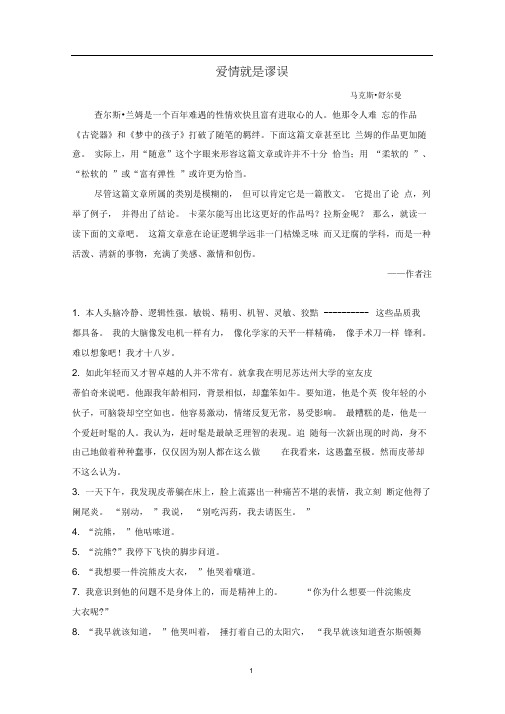
爱情就是谬误马克斯•舒尔曼查尔斯•兰姆是一个百年难遇的性情欢快且富有进取心的人。
他那令人难忘的作品《古瓷器》和《梦中的孩子》打破了随笔的羁绊。
下面这篇文章甚至比兰姆的作品更加随意。
实际上,用“随意”这个字眼来形容这篇文章或许并不十分恰当;用“柔软的”、“松软的”或“富有弹性”或许更为恰当。
尽管这篇文章所属的类别是模糊的,但可以肯定它是一篇散文。
它提出了论点,列举了例子,并得出了结论。
卡菜尔能写出比这更好的作品吗?拉斯金呢?那么,就读一读下面的文章吧。
这篇文章意在论证逻辑学远非一门枯燥乏味而又迂腐的学科,而是一种活泼、清新的事物,充满了美感、激情和创伤。
——作者注1. 本人头脑冷静、逻辑性强。
敏锐、精明、机智、灵敏、狡黠---------- 这些品质我都具备。
我的大脑像发电机一样有力,像化学家的天平一样精确,像手术刀一样锋利。
难以想象吧!我才十八岁。
2. 如此年轻而又才智卓越的人并不常有。
就拿我在明尼苏达州大学的室友皮蒂伯奇来说吧。
他跟我年龄相同,背景相似,却蠢笨如牛。
要知道,他是个英俊年轻的小伙子,可脑袋却空空如也。
他容易激动,情绪反复无常,易受影响。
最糟糕的是,他是一个爱赶时髦的人。
我认为,赶时髦是最缺乏理智的表现。
追随每一次新出现的时尚,身不由己地做着种种蠢事,仅仅因为别人都在这么做在我看来,这愚蠢至极。
然而皮蒂却不这么认为。
3. 一天下午,我发现皮蒂躺在床上,脸上流露出一种痛苦不堪的表情,我立刻断定他得了阑尾炎。
“别动,”我说,“别吃泻药,我去请医生。
”4. “浣熊,”他咕哝道。
5. “浣熊?”我停下飞快的脚步问道。
6. “我想要一件浣熊皮大衣,”他哭着嚷道。
7. 我意识到他的问题不是身体上的,而是精神上的。
“你为什么想要一件浣熊皮大衣呢?”8. “我早就该知道,”他哭叫着,捶打着自己的太阳穴,“我早就该知道查尔斯顿舞再度流行时,浣熊皮大衣也会再次时兴起来。
我真傻,所有的钱都买了课本,而现在却没钱买浣熊皮大衣了。
高级英语二Lesson4课件
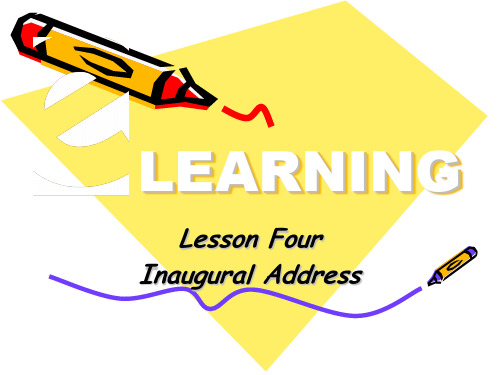
• 6) His own family: On September 12, 1953, Kennedy and Jacqueline Bouvier were married • They had three children--Caroline; John, Jr., whom his father called John-John; and Patrick Bouvier, who lived but a few days.
• Kennedy received only 18, 574 more votes than Nixon – • a fraction of 1 percent of the total vote.
Visiting Ireland
His last day in Texas on Nov. 22nd, 1963
• Style of the speech: • figures of speech, e.g. antithesis.
对偶,对句
• the appropriate use of words , parallel and balanced structures, repetition of words and phrases,
• The eldest: Joseph died in WWⅡ • The second: John
• • • •
Games, • The ex- mother-in-law of Arnold Schwarzenegger
F. Kennedy The fourth: died in an air crash The seventh: candidate, assassinated The eldest girl: mental problem The fifth: Eunice: Special Olympics
高级英语2第三版 unit4 课文翻译+课后英译汉部分划线 英语完整版
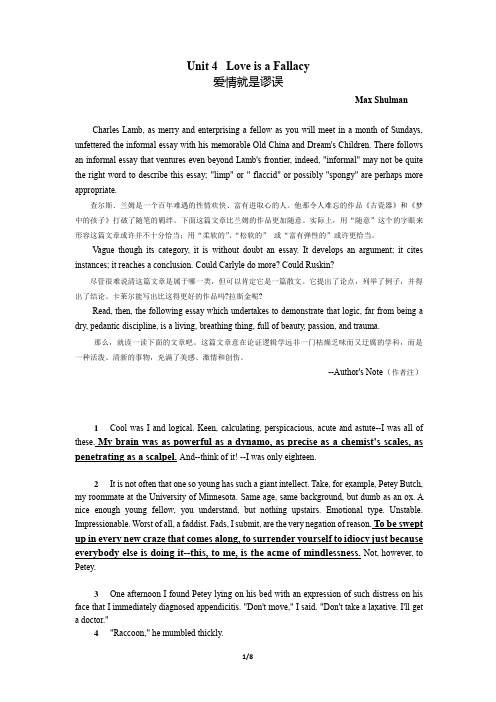
Unit 4 Love is a Fallacy爱情就是谬误Max ShulmanCharles Lamb, as merry and enterprising a fellow as you will meet in a month of Sundays, unfettered the informal essay with his memorable Old China and Dream's Children. There follows an informal essay that ventures even beyond Lamb's frontier, indeed, "informal" may not be quite the right word to describe this essay; "limp" or " flaccid" or possibly "spongy" are perhaps more appropriate.查尔斯.兰姆是一个百年难遇的性情欢快、富有进取心的人。
他那令人难忘的作品《古瓷器》和《梦中的孩子》打破了随笔的羁绊。
下面这篇文章比兰姆的作品更加随意。
实际上,用“随意”这个的字眼来形容这篇文章或许并不十分恰当;用“柔软的”、“松软的”或“富有弹性的”或许更恰当。
Vague though its category, it is without doubt an essay. It develops an argument; it cites instances; it reaches a conclusion. Could Carlyle do more? Could Ruskin?尽管很难说清这篇文章是属于哪一类,但可以肯定它是一篇散文。
它提出了论点,列举了例子,并得出了结论。
高英二第四课
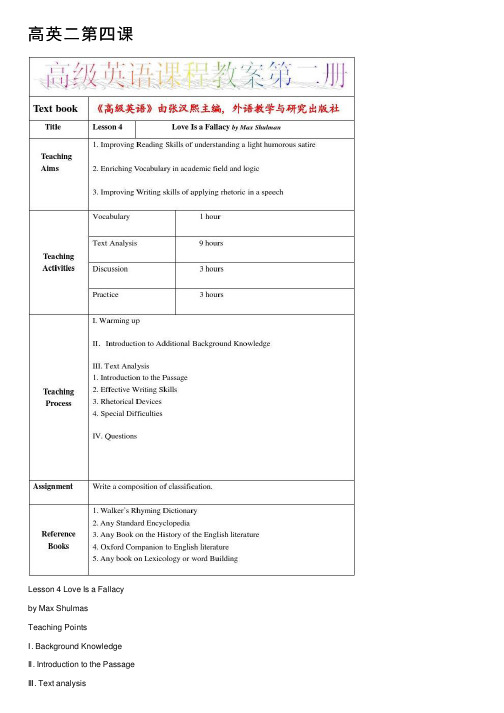
⾼英⼆第四课Lesson 4 Love Is a Fallacy by Max Shulmas Teaching PointsⅠ. Background Knowledge Ⅱ. Introduction to the Passage Ⅲ. Text analysisⅣ. Rhetorical DevicesⅤ. QuestionsTeaching ProcessWarming upQuestion 1:What is love?Question 2: What is logic?Question 3: Love is blind?Question 4: Love is reason?Introduction to the Passage1. Type of literature: a piece of narrative writing--protagonist/antagonists--climax--denouement2. The main theme3. Well chosen title and words4. Style--a very fast pace with a racy dialogue full of American colloquialism and slang--employing a variety of writing techniques to make the story vivid, dramatic and colorfulText AnalysisVocabulary1. Pay attention to words and expressions in the following aspects respectively:Spelling and PronunciationSynonymsOppositesSimilar words and expressionsSettled or habitual usage2. Word building knowledgeEffective Writing Skills1. Employing colorful lexical spectrum, from the ultra learned terms to the infra clipped vulgar forms2. Too much figurative language and ungrammatical inversion for specific purposes3. The using of short sentences, elliptical sentences and dashes to maintain the speed of narration Rhetorical Devices1. metaphor2. antithesis3. transferred epithet4. hyperbole5. metonymy6. litotes7. ellipsis8. synecdoche9. inversion10. simile11. mixed metaphor12. rhetorical questionsSpecial DifficultiesAnalyzing the logical fallaciesUsing inverted sentences to achieve emphasisEffectively using many figures of speechUnderstanding colloquial expressions and slangAllusions:--Frankenstein--PygmalionParaphrasing some sentencesIdentifying figures of speechQuestions1. Define and give an example of each of the logical fallacies discussed in this essay.2. Can you find any evidence to support the view that the writer is satirizing a bright but self-satisfied young man?3. Comment on the language used by Polly. What effect does her language create?4. Why does the writer refer to Pygmalion and Frankenstein? Are these allusions aptly chosen?5. In what sense is the conclusion ironic?Assignment:Write a composition of classification.Lesson 4 Love Is a Fallacyby Max ShulmanⅠ. Additional Information Related to the Text:1. Max SchulmanMax Schulman (1919-1988) was a 20th century American writer humorist best known for his television and short story character Dobie Gillis, as well as for best-selling novels.He first delved into the world of writing as a journalist student at the University of Minnesota. Max Schulman?s earliest published writing was for Ski-U-Mah, the college humor magazine of the University of Minnesota, in the 1930s. His writing often focused on young people, particularly in a collegiate setting. He wrote his first novel, Barefoot Boy with Cheek《⽆礼的⾚脚少年》a satire on college life, while still a student. Schulman?s works include the novels Rally Round the Flag, Boys!,《孩⼦们,团结在旗帜的周围吧》which was made into a film starring Paul Newman and Joanne Woodward; The Feather Merchant《⾐冠楚楚的商⼈》,The Zebra Derby, Sleep till Noon, and Potatoes Are Cheaper. He was also a co-writer, with Robert Paul Smith, of the long-running Broadway play, The Tender Trap, which was later adapted into a movie starring Frank Sinatra and Debbie Reynolds.Schulman?s college charater, Dobie Gillis, was the subject of a series of short stories complied under the title The Many Loves of Dobie Gillis, which became the basis for the 1953 movie The Affairs of Dobie Gillis. Shulman also wrote the series? theme song. The same year the series began. Schulman published a Dobie Gillis novel, I was a Teenage Dwarf (1959). After his success with Dobie Gillis, Shulman syndicated a humor column, “On Campus”, to over 350 collegiate newspapers at one point.A later novel, Anyone Got A Match? satirized both the television and tobacco industries, as well as the Soth and college football. His last major project was House Calls, which began as a 1978 movie based on one of his stories; it spun off the 1979-1982 television series of the same name. Schulman was the head writer.Also a screenwriter, Schulman was one of the collaborators on a 1954 non-fiction television program, Light’s Diamond Jubilee, timed to the 75th anniversary of the invention of the lihght bulb.2. Logical fallacy:逻辑谬误An argument in logic presents evidence in support of some thesis or conclusion.(逻辑论证,即提⽀持某些论题或结论的论据。
高级英语第二册第四课学习辅导资料

symbolizing an end as well as a beginning, signifying renewal as well as change. For I have sworn before you and Almighty God the same solemn oath our forebears prescribed nearly a century and three-quarters ago.abolish all forms of human poverty and all forms of human life. And yet the same revolutionary belief for which our forebears fought is still at issue around the globe, the belief that the rights of man come not from the generosity of the state but from the hand of God.word go forth from this time and place, to friend and foe alike, that the torch has been passed to a new generation of Americans, born in this century, tempered by war, disciplined by a hard and bitter peace, proud of our ancient heritage, and unwilling to witness or permit the slow undoing of these human rights to which this nation has always been committed, and to which we are committed today at home and around the world.price, bear any burden, meet any hardship, support any friend, oppose any foe to assure the survival and the success of liberty.loyalty of faithful friends. United, there is little we cannot do in a host of co-operative ventures. Divided, there is little we can do, for we dare not meet a powerful challenge at odds and split asunder.word that one form of colonial control shall not have passed away merely to be replaced by a far more iron tyranny. We shall not always expect to find them supporting our view. But we shall always hope to find them strongly supporting their own freedom, and to remember that, in the past, those who foolishly sought power by riding the back of the tiger ended up inside.bonds of mass misery, we pledge our best efforts to help them help themselves, for whatever period is required, not because the Communists may be doing it, not because we seek their votes, but because it is right. If a free society cannot help the many who are poor, it cannot save the few who are rich.our good words into good deeds, in a new alliance for progress, to assist free men and free governments in casting off the chains of poverty. But this peaceful revolution of hope cannot become the prey of hostile powers. Let all our neighbors know that we shall join with them to oppose aggression or subversion anywhere in the Americas.And let every other power know that this hemisphere intends to remain the master of its own house.hope in an age where the instruments of war have far outpaced the instruments of peace, we renew our pledge of support: to prevent it from becoming merely a forum for invective, to strengthen its shield of the new and the weak, and to enlarge the area in which its writ may run.not a pledge but a request: that both sides begin anew the quest for peace, before the dark powers of destruction unleashed by science engulf all humanity in planned or accidental self-destruction.beyond doubt can we be certain beyond doubt that they will never be employed.our present course--both sides overburdened by the cost of modern weapons, both rightly alarmed by the steady spread of the deadly atom, yet both racing to alter that uncertain balance of terror that stays the hand of mankind's final war.weakness, and sincerity is always subject to proof. Let us never negotiate out of fear, but let us never fear to negotiate.problems which divide us.the inspection and control of arms and bring the absolute power to destroy other nations under the absolute control of all nations.Together let us explore the stars, conquer the deserts, eradicate disease, tap the ocean depths and encourage the arts and commerce.to "undo the heavy burdens...(and) let the oppressed go free".both sides join in creating a new endeavor, not a new balance of power, but a new world of law, where the strong are just and the weak secure and the peace preserved.in the first one thousand days, nor in the life of this Administration, nor even perhaps in our lifetime on this planet. But let us begin.failure of our course. Since this country was founded, each generation of Americans has been summoned to give testimony to its national loyalty. The graves of youngAmericans who answered the call to service surround the globe.we need; not as a call to battle, though embattled we are; but a call to bear the burden of a long twilight struggle, year in and year out, "rejoicing in hope, patient in tribulation," a struggle against the common enemies of man: tyranny, poverty, disease and war itself.South, East and West, that can assure a more fruitful life for all mankind? Will you join in the historic effort?role of defending freedom in its hour of maximum danger. I do not shrink from this responsibility; I welcome it. I do not believe that any of us would exchange places with any other people or any other generation. The energy, the faith, the devotion which we bring to this endeavor will light our country and all who serve it, and the glow from that fire can truly light the world.what you can do for your country.together we can do for the freedom of man.here the same high standards of strength and sacrifice which we ask of you. With a good conscienceour only sure reward, with history the final judge of our deeds, let us go forth to lead the land we love, asking His blessing and His help, but knowing that here on earth God's work must truly be our own.(from A Treasury of the World's Great Speeches, 1965)1. inaugural address: since 1937, Inauguration Day has been changed to Jan. 20. On this day every four years the newly elected president of the United States faces the people for the first time, takes the presidential oath of office and delivers his inaugural address.2. solemn oath: the presidential oath, traditionally administered by the Chief Justice, is prescribed in Article II, section 1 of the Constitution of the United States. The oath runs as follows: "I do solemnly swear (or affirm) that I will faithfully execute the Office of President of the United States, and will to the best of my ability, preserve, protect and defend the Constitution of the United States. "3. The belief that the rights of man.., hand of God: refers to a passage in the American Declaration of Independence: "We hold these truths to be self-evident, that all men are created equal, that they are endowed by their Creator with certain unalienable Rights, that among these are Life, Liberty and the pursuit of Happiness. "4. command of Isaiah: one of the greatest Hebrew prophets whose writings are extant (late 8th century B. C. ) ; venerated by rabbis as 2nd only to Moses. The Book of Isaiah, a book in the Old Testament of the Bible of the Christian, is believed to be a work of two authors of different periods; chapters 1--39 relate to the history of the Israelites; chapters 40--66 foretell the coming of the Messiah. The quotation in the text is taken from chapter 58, verse 6: "Is not this the fast that I have chosen? to loose the bands of wickedness, to undo the heavy burdens, and to let the oppressed go free, and that ye break every yoke?"1.To know the features of a political speech.2.To analyze the structure of this address3.To appreciate the language features of Kennedy’s address4.To be acquainted with some English speechesTeaching Contents1.J.F. Kennedy2.The characteristics of a political speech3.Detailed study of the textanizational patternnguage features6.Exercises7.English speechTime allocation1.John Kennedy (15 min.)2.The characteristics of a political speech (10 min.)3.Detailed study of the text (100 min.)4.Structure analysis (15 min.)nguage appreciation (15 min.)6.English speeches (25 min)词汇(Vocabulary)inaugural (adj.) : of an inauguration就职(典礼)的signify (v.) : be a sign or indication of;mean表明;意味almighty (adj.) : having unlimited power;all—powerful有无限权力的;全能的forebear (n.) : an ancester 祖先,祖宗prescribe (v.) : set down as a rule or direction;order;ordain;direct命令;指示;规定,订立generosity (n.) : the quality of being generous慷慨;宽宏大量heir (n.) : person who appears to get some trait from a predecessor or seems to carry on in his tradition继承者;后嗣foe (n.) : enemy;opponent敌人undoing (n.) : the act of bringing to ruin,disgrace,or destruction毁灭;破坏at odds : in disagreement;quarreling意见不一致;有争执asunder (adv.) : into parts or pieces分成碎片;分散prey (n.) : a person or thing that falls victim to someone or something牺牲品;掠夺品subversion (n.) : a subverting or being subverted.ruin 颠覆(活动);破坏sovereign (adj.) : independent of all others独立自主的outpace (v.) : surpass;exceed在速度上超过;胜过invective (n.) : a violent verbal attack.strong criticism,insults, curses, etc.; vituperation 抨击;辱骂,谩骂shield (n.) : any person or thing that guards,protects,or defends; protection保护人;防护物;保护writ (n.) : a formal legal document ordering or prohibiting some action命令;律令;文书;传票adversary (n.) : a person who opposes or fights against another; opponent;enemy对手,反对者;敌手,敌方anew (adv.) : again重新,再unleash (v.) : release from or as from a leash(解开皮带以)释放engulf (v.) : swallow up;overwhelm 吞没,淹没,压倒civility (n.) : politeness.esp. in a merely formal way 礼貌,客气belabor (v.) : talk about at unnecessary length唠唠叨叨地反复讲formulate (v.) : put together and express (a theory.plan ,etc.)a systematic way系统地阐述(或提出)(理论、计划等)tap (v.) : draw upon;make use of开发、发掘heed (v.) : pay close attention to;take careful notice of注意, 留神,留心beachhead (n.) : a position established by invading troops on an enemy shore;a position gained as a secare starting point for any action;foothold滩头堡,登陆场;立足点endeavor (n.) : an earnest attempt or effort努力,尽力testimony (n.) : any form of evidence,indication. etc.;proof证明,证据embattle (v.) : [常用于被动语态]prepare,array,or set in line for battle使准备战斗,使严阵以待tribulation (n.) : great misery or distress, as from oppression;deep sorrow苦难;困苦;忧伤forge (v.) : move forward steadily,as if against difficulties; form;produce(似乎迎着困难)稳步前进;形成;结成alliance (n.) : a close association for a common objective as of nations,political parties,etc.联盟,联合,同盟短语(Expressions)at issue : in dispute;to be decided;at variance;in disagreement意见不一致例:What is at issue is the ex tent to which exam results reflect a student’s ability.意见的分歧之处在于考试对于学生能力的影响程度。
高级英语第二册第四课 Inaugural Adress by John F. Kennedy 修辞评论680字

南华大学船山学院英语081班石璇 20089210113This a Inaugural Address, made by the 35th president of United States John F.Kennedy on January 20,1961.The object of a political speech is to explain, convince and persuade the people that what he is saying and planning to do best represents their interests so they should support him, and I think in this speech rhetoric mainly contribute to its success. It is highly rhetorical, such as many figures of speech, choice and use of words, effective types of sentence.In this address, many figures of speech are employed. The first one is antithesis,which highlights the key points.For example, "United,there is little we cannot do in a host of co-operative ventures.Divide,there is little we can do,for we dare not meet a powerful challenge at odds and split asunder",it emphasizes the president's appealing to uniting together.Besides,this sentense "ask not what your country can do for you,ask what you can do for your country."is often quoted because it represents the enterprising spirit of the Americans.Second, metaphor.Metaphor makes the speech easier understanded and acceptable in a pleased way.For example," those who foolishly sought power by riding the back of the tiger ended up inside",in which riding the back of the tiger comparing to seeking the aid of socialist countries;"to strengthen its shield of the new and the weak",in which the power of UN to protect compared to a shield.Third, parallelism.For example," we shall pay any price, bear any burden,meet any hardship,support any friend,oppse any foe to assure the survival and the success of liberty", "Together let us explore the stars, conquer the deserts, eradicate disease, tap the ocean depths and encourage the arts and commerce,and paragraphs 6,7,8,10,11 begin with the same type of phrases "To those old allies...To those new states...to those peoples...to oursister republics....to that world assembly...to those nations...." and paragraph 16 to18 begin with"let both sides",all of which clearly show the president's stand and the beautiful hope everyone holds so that he can get the support of his people.Fourth,synecdoche.For example,in this sentense "Yet both racing to alter that uncertain balance of terror that stays the hand of mankind's final war",the hand substitute the power human hands can do.Fifth,repetition.The word "pledge"is emphasized in every paragraph from 5 to 11,pledging according pledge to different groups,"free" and "good" are repeated to highlight human's common desire, and "beyond doubt" is repeated to show the American wouldn't let anything terrible made by the enemy countries happen.The speech is very persuasive due to these important repetition.Sixth,alliteration,such as "friend and foe alike","pay any price,bear any burden", "break the bonds of mass misery"makes the speech more catchy and rhymed.In addition ,there are many examples to show that Kennedy is very particular and careful in his choice of and use of words.For instance,in the sentence "to our sister republics south of our border ,we offer a special pledge,"the word"sister"is particularly chosen to connote equality and mutual good relations in his attempt to allay the traditional fears these countries have of their powerful big brother in the north.And in the sentence"Finally,to those nations who would make themselves our adversary,we offer not a pledge but a request",the phrase"would make themselves our adversary"is again cleverly chosen to throw the blame for confrontation and world tension on the other party.It suggests that the United States has done nothing to create enemies.It is the other side that is challenging the U.S.,and the latter is forced to take the challenge although it really wants peace.Furthermore,the variant types of sentence are employed.It is obviously that many of the sentences are very long,even a paragraph is consisted of a long sentence,but the longer the sentence is,the more information and more power the sentence contains.They also add salutation and decency.Besides,complex-compound sentences such as attributive clause,adverbial clause,inverted sentence are mostly used.In addition,imperative sentences not only arouse people's passion,but also of great st,the biblical style sentence,such as"Let the word go forth from this time and place,to friend and foe alike,that the torch ....","with a good conscience our only sure reward,with history..."make the speech more solemn and powerful.Rhetoric really does god job.。
unit 4 高英二册第四课

Remark of Kennedy‘s Inaugural
肯尼迪从当选之后就开 始考虑就职演说,他 不想在演说中偏激地 指责当前事务,也不 喜欢重新阐述有关于 冷战的陈词滥调、论 述一些有可能加剧美 苏紧张关系的有关共 产主义威胁的问题。 他希望用词可以激起 和平的希望,确定一 个新时代的乐观基调
在演说中,他呼吁全人类团结起来,共同反对专 制、贫困、疾病和战争,他在演说中提到的:“ 不要问你的国家能为你做些什么,而要问一下你 能为你的国家做些什么。”(Ask not what your country can do for you ,ask what you can do for your country.)更是成为了美国总统历次就职演 说中最脍炙人口的语句之一。在他的就职演说后 ,约有四分之三的美国民众认可了新总统。这表 明肯尼迪平稳地渡过了权力交替期。
John F. Kennedy Center for the Performing Arts.
Kennedy has
appeared on the U.S. half-dollar coin since 1964
Tem-8 related information
JFK was one of the most famous US Presidents.
Questions in Tem-8
U.S. presidents normally serves a (an) ___term.
A. two-year
B. four-year C. six-year D. eight-year (2005 Tem-8) The Presidents during the American Civil War was __. A. Andrew Jackson B. Abraham Lincoln C. Thomas Jefferson D. George Washington (2006 Tem-8) The Declaration of Independence was written by__. A. Thomas Jefferson B. George Washington C. Alexander Hamilton D. James Madison (2007 Tem8)
- 1、下载文档前请自行甄别文档内容的完整性,平台不提供额外的编辑、内容补充、找答案等附加服务。
- 2、"仅部分预览"的文档,不可在线预览部分如存在完整性等问题,可反馈申请退款(可完整预览的文档不适用该条件!)。
- 3、如文档侵犯您的权益,请联系客服反馈,我们会尽快为您处理(人工客服工作时间:9:00-18:30)。
Lesson 4 Love Is a Fallacyby Max ShulmasTeaching PointsⅠ. Background KnowledgeⅡ. Introduction to the PassageⅢ. Text analysisⅣ. Rhetorical DevicesⅤ. QuestionsTeaching ProcessWarming upQuestion 1:What is love?Question 2: What is logic?Question 3: Love is blind?Question 4: Love is reason?Introduction to the Passage1. Type of literature: a piece of narrative writing--protagonist/antagonists--climax--denouement2. The main theme3. Well chosen title and words4. Style--a very fast pace with a racy dialogue full of American colloquialism and slang--employing a variety of writing techniques to make the story vivid, dramatic and colorfulText AnalysisVocabulary1. Pay attention to words and expressions in the following aspects respectively:Spelling and PronunciationSynonymsOppositesSimilar words and expressionsSettled or habitual usage2. Word building knowledgeEffective Writing Skills1. Employing colorful lexical spectrum, from the ultra learned terms to the infra clipped vulgar forms2. Too much figurative language and ungrammatical inversion for specific purposes3. The using of short sentences, elliptical sentences and dashes to maintain the speed of narration Rhetorical Devices1. metaphor2. antithesis3. transferred epithet4. hyperbole5. metonymy6. litotes7. ellipsis8. synecdoche9. inversion10. simile11. mixed metaphor12. rhetorical questionsSpecial DifficultiesAnalyzing the logical fallaciesUsing inverted sentences to achieve emphasisEffectively using many figures of speechUnderstanding colloquial expressions and slangAllusions:--Frankenstein--PygmalionParaphrasing some sentencesIdentifying figures of speechQuestions1. Define and give an example of each of the logical fallacies discussed in this essay.2. Can you find any evidence to support the view that the writer is satirizing a bright but self-satisfied young man?3. Comment on the language used by Polly. What effect does her language create?4. Why does the writer refer to Pygmalion and Frankenstein? Are these allusions aptly chosen?5. In what sense is the conclusion ironic?Assignment:Write a composition of classification.Lesson 4 Love Is a Fallacyby Max ShulmanⅠ. Additional Information Related to the Text:1. Max SchulmanMax Schulman (1919-1988) was a 20th century American writer humorist best known for his television and short story character Dobie Gillis, as well as for best-selling novels.He first delved into the world of writing as a journalist student at the University of Minnesota. Max Schulman‟s earliest published writing was for Ski-U-Mah, the college humor magazine of the University of Minnesota, in the 1930s. His writing often focused on young people, particularly in a collegiate setting. He wrote his first novel, Barefoot Boy with Cheek《无礼的赤脚少年》a satire on college life, while still a student. Schulman‟s works include the novels Rally Round the Flag, Boys!,《孩子们,团结在旗帜的周围吧》which was made into a film starring Paul Newman and Joanne Woodward; The Feather Merchant《衣冠楚楚的商人》,The Zebra Derby, Sleep till Noon, and Potatoes Are Cheaper. He was also a co-writer, with Robert Paul Smith, of the long-running Broadway play, The Tender Trap, which was later adapted into a movie starring Frank Sinatra and Debbie Reynolds.Schulman‟s college charater, Dobie Gillis, was the subject of a series of short stories complied under the title The Many Loves of Dobie Gillis, which became the basis for the 1953 movie The Affairs of Dobie Gillis. Shulman also wrote the series‟theme song. The same year the series began. Schulman published a Dobie Gillis novel, I was a Teenage Dwarf (1959). After his success with Dobie Gillis, Shulman syndicated a humor column, “On Campus”, to over 350 collegiate newspapers at one point.A later novel, Anyone Got A Match? satirized both the television and tobacco industries, as well as the Soth and college football. His last major project was House Calls, which began as a 1978 movie based on one of his stories; it spun off the 1979-1982 television series of the same name. Schulman was the head writer.Also a screenwriter, Schulman was one of the collaborators on a 1954 non-fiction television program, Light’s Diamond Jubilee, timed to the 75th anniversary of the invention of the lihght bulb.2. Logical fallacy:逻辑谬误An argument in logic presents evidence in support of some thesis or conclusion.(逻辑论证,即提支持某些论题或结论的论据。
)An argument has two components:a conclusion,the thesis argued for; and certain premises, the considerations adduced on behalf of the conclusion. The conclusion is said to be drawn, or inferred, from the premises. (论据由两部分组成:论点所支持的结论,与引证结论的某些前提。
